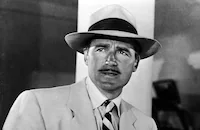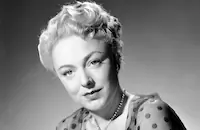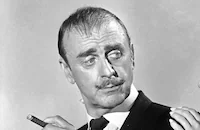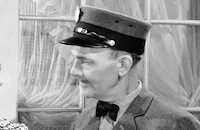Dream Girl
Cast & Crew
Mitchell Leisen
Betty Hutton
Macdonald Carey
Patric Knowles
Virginia Field
Walter Abel
Film Details
Technical Specs

Synopsis
Georgina Allerton, a daydreaming twenty-two year-old debutante, is in love with Jim Lucas, the man her older sister Miriam is about to marry. During the wedding, Georgie daydreams that Jim stops the ceremony so that he and Georgie can wed. One of the wedding guests is newspaper reporter Clark Redfield, who is immediately smitten with Georgie. Two years later, Georgie has tried singing lessons, has made an amateurish attempt at a first novel, and is losing money running her own bookshop. Jim, meanwhile, has had an unsuccessful stint in the publishing business, and he and Miriam are still living with her parents. When a manuscript that Jim had passed up becomes a best-seller, Miriam flies into a rage in public and only Georgie remains sympathetic to Jim. In a reckless attempt to rid herself of feelings for Jim and Clark, Georgie goes to a nightclub with a "wolf" named George Hand, who invites her to go to Mexico with him. Clark arrives at the club in time to warn Georgie about Hand's bad reputation, then tells her she is "as unsophisticated as Alice in Wonderland." Clark's insult prompts Georgie to imagine that, while caught in a lovers' triangle in Mexico, she shoots Hand's wife. She then becomes a fugitive and a singer in a South Sea island honky-tonk, where she kills herself, and dies in front of Jim. When Georgie wakes from her reverie to find herself being propositioned by Hand, she angrily rebuffs him. Meanwhile, Mrs. Allerton has tired of supporting Jim, and Miriam leaves him. On the night Jim is to fly to Reno for the divorce, he tells Georgie that he wants to marry her, and she imagines having a baby with him on a ranch. Clark, however, has invited Georgie to dinner and the opera, and she has reluctantly agreed to go out with him. At dinner, Clark criticizes Georgie's novel for its "moony" characterizations, and later at the opera, Georgie dreams that she brilliantly performs the role of "Cho-Cho-San" in Madame Butterfuly and wins Clark's respect as well as an apology. While Jim waits at the airport for Georgie, she sits in a diner with Clark, falling in love with him. As they dance, Clark cautions Georgie to stop hiding from reality, and urges her to turn her dreams into reality. At three-thirty in the morning, Georgie telephones her parents to tell them that she and Clark have married.

Director

Mitchell Leisen
Cast

Betty Hutton

Macdonald Carey

Patric Knowles

Virginia Field

Walter Abel
Peggy Wood
Carolyn Butler

Lowell Gilmore
Zamah Cunningham

Frank Puglia
Georgia Backus
Charles Meredith
Selmar Jackson
Dorothy Christy
Antonia Morales

John Dehner
Tad Van Brunt
Catherine Price
Renee Randall
Audrey Westphall
Pat Patrick
Gordon Arnold
George Peters
Robert Rich
Billy Burt
John S. Roberts
Jean Acker

Mary Maclaren

Bess Flowers
Bob Landry
John Marlowe
Paul Russell
Frederic Nay
Gino Corrado
Jerry James
Armando Gonzales
Paul Oman
Gladys Blake

John Butler
Sedal Bennett
Frank Mayo
Don Avalier
Al Kikume
Noble Johnson
Jospeh J. Lilley
Isabel Randolph
Ida Moore
Almeda Fowler
Dick Keene
Crew
Haskell Boggs
Hugh Brown
Sam Comer
Nadine Connor
John Coonan
Billy Daniels
Hans Dreier
Farciot Edouart
Ray Evans
Daniel L. Fapp
Giuseppe Giacosa
Grace Gregory
Edith Head
Harry Hogan
Luigi Illica
Gordon Jennings
Jack Koffman
Vil Larino
Mitchell Leisen
Jay Livingston
Alma Macrorie
Don Mckay
John Meehan
Erwin Newmeyer
Walter Oberst
Giacomo Puccini
Wally Westmore
P. J. Wolfson
Victor Young

Film Details
Technical Specs

Quotes
Trivia
Notes
The spoken foreword to the film states: "We're about to ask you wonderful people out there to do a very dirty trick. We want you to listen in on a young lady who talks to herself about herself whenever she gets a chance. And when she runs out of words, takes right off into a great big daydream. If you have never done any of these things, it wouldn't be fair. Will anyone who hasn't please leave the theater?" No screenplay credit is included in the film. Although prior to this film's general release, Arthur Sheekman was credited with writing the script, his name was removed from the final prints. The New York Times, which gave the film an unfavorable review, stated, "It strikes us as highly significant that no writers claim credit for the script."
According to modern sources, Elmer Rice wrote the play for his wife, actress Betty Field, who played the lead in the hit Broadway production. Field was expected to recreate her stage role on the screen, but was passed over for Betty Hutton, who had more box office pull. Paramount reportedly paid Rice $200,000 for the screen rights to his play. Several reviews commented unfavorably on the decision to make "Georgie" upper class, instead of middle-class, as she is in the play. In the play, Georgie's daydreams helped her to liberate herself from her hopelessly mundane life. Hutton's voice was dubbed by New York Metropolitan Opera soprano Nadine Connor for the "One Fine Day" aria from Madame Butterfly, according to Variety. This film marked Hutton's return to the screen after a year's absence, during which she gave birth to daughter Lindsay Diane Briskin. According to Paramount News, Joe Lilley, of Paramount's music department, made his acting debut in the film as the piano player in the South Sea honky-tonk sequence. According to CBCS records, John Abbott was originally set to play the role of "Professor Meely," but his role was cut from the film.












